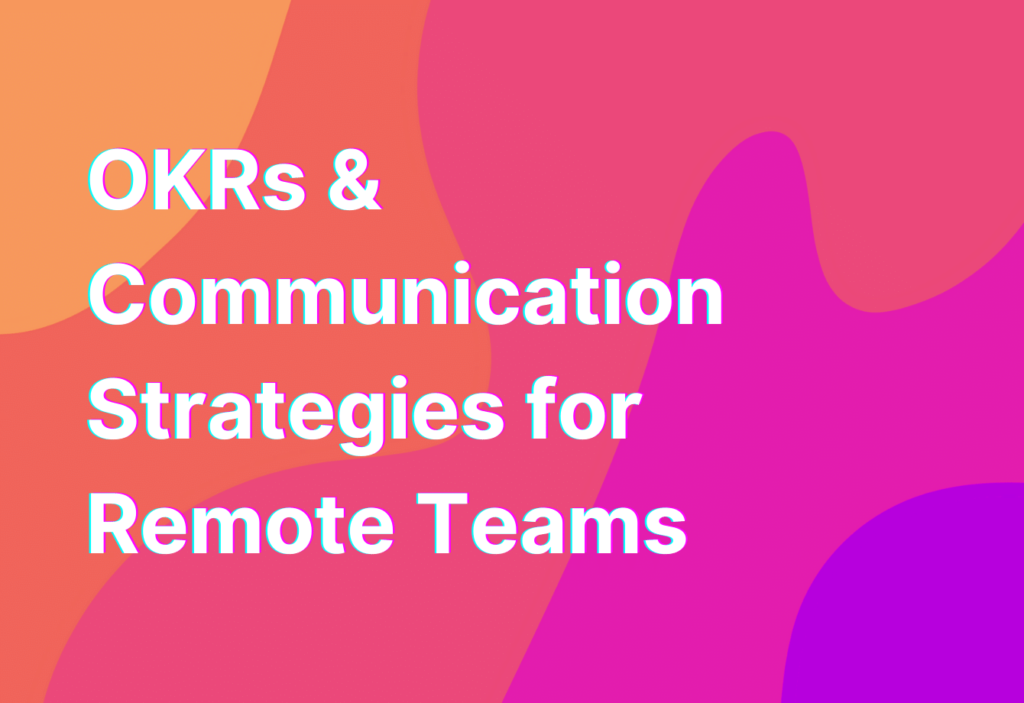OKRs & Communication Strategies for Remote Teams
Hey there, remote work enthusiasts! It’s Ashley here, your friendly remote work advocate with 10 years of experience in the tech industry. Today, I want to talk about a topic that is crucial for the success of remote teams: Objectives and Key Results, also known as OKRs. Plus, I’ll share some communication strategies that can help your remote team thrive. So, let’s dive in!
What are OKRs?
OKRs are a goal-setting framework that can help remote teams align their efforts and measure their progress. They consist of two components: Objectives and Key Results. Objectives are the big-picture goals that you want to achieve, while Key Results are the measurable outcomes that indicate whether you’re making progress towards those objectives.
For example, let’s say your objective is to increase website traffic. Your key results could be to achieve a 20% increase in organic search traffic, a 15% increase in referral traffic, and a 10% increase in social media traffic. These key results provide clear metrics that can be tracked and evaluated.
OKRs are typically set on a quarterly basis, but they can also be adjusted or updated as needed. They provide a framework for remote teams to focus their efforts, prioritize tasks, and measure their success.
Why are OKRs important for remote teams?
Remote teams face unique challenges when it comes to communication and collaboration. Without the physical presence of a shared office space, it can be easy for team members to feel disconnected or lose sight of the bigger picture. That’s where OKRs come in.
OKRs provide remote teams with a clear sense of direction and purpose. They help team members understand how their individual contributions align with the overall goals of the team. This alignment fosters a sense of unity and shared purpose, even when team members are physically scattered across different locations.
Additionally, OKRs provide remote teams with a framework for accountability and transparency. By setting clear objectives and measurable key results, team members can track their progress and hold themselves accountable for their individual contributions. This transparency also allows team members to see how their colleagues are progressing towards their goals, fostering a sense of collaboration and support.
Communication Strategies for Remote Teams
Now that we understand the importance of OKRs for remote teams, let’s explore some communication strategies that can enhance collaboration and productivity:
- Regular Check-ins: Schedule regular check-ins with your team to discuss progress, challenges, and next steps. These check-ins can be done through video calls, instant messaging, or project management tools. The key is to maintain open lines of communication and ensure that everyone is on the same page.
- Clear Communication Channels: Establish clear communication channels for different types of communication. For example, use email for formal announcements, instant messaging for quick questions or updates, and video calls for team meetings or brainstorming sessions. This clarity helps to avoid miscommunication and ensures that important information is shared effectively.
- Document Sharing: Utilize document sharing tools, such as Google Drive or Dropbox, to collaborate on projects and share important files. This allows team members to access and edit documents in real-time, regardless of their physical location.
- Virtual Team Building: Foster a sense of camaraderie and team spirit through virtual team building activities. This could include virtual happy hours, online games, or even virtual team retreats. These activities help to build relationships and strengthen the bond between remote team members.
- Feedback and Recognition: Provide regular feedback and recognition to remote team members. This can be done through one-on-one feedback sessions, public recognition in team meetings, or even virtual shout-outs in team communication channels. Recognizing and appreciating the efforts of remote team members boosts morale and motivation.
By implementing these communication strategies and incorporating OKRs into your remote team’s workflow, you can create a strong foundation for success. Remember, remote work is all about finding the right balance between independence and collaboration.
Wrapping Up
OKRs are a powerful tool for remote teams, providing clarity, alignment, and accountability. By setting clear objectives and measurable key results, remote teams can stay focused and motivated, even when physically separated. Additionally, effective communication strategies, such as regular check-ins and clear communication channels, enhance collaboration and productivity.
If you want to learn more about remote team performance metrics and communication strategies, check out this link. It’s a great resource that dives deeper into this topic.
That’s all for now, remote work warriors! Keep embracing the remote work lifestyle and remember to find joy in the flexibility and freedom it offers. Until next time!


